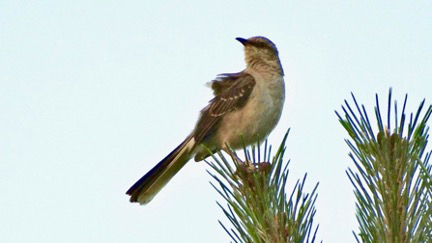The Magic of Birdsong: Finding Peace In the Midst of a Pandemic

A Secret Source To Finding Calm In Nature’s “Sublime Music”
We all love birds. Throughout the ages, we have delighted in their soaring flight, and been astonished and uplifted by their brilliant colors and the magic of their songs.
Thomas Jefferson famously befriended birds. At Monticello, he called them “the delight of every hour.” At the White House, where he resided from 1801 to 1809, he kept four mockingbirds as companions. His favorite one was Dick, who joined him on his shoulder to sing as the third president played violin. At night the mockingbird followed Jefferson up the staircase to sing him to sleep. Jefferson was in awe of the spiritual power of birds, suggesting it was superior to that of humans. He wrote, “Teach all the children to venerate the mocking-bird as a superior being in the form of a bird.”
Others have been equally spellbound by birds and their songs. Beethoven incorporated notes to sound like birdsong in his music. Naturalists, philosophers, and mystics from both East and West have expounded on the beauty and mystery of birdsong. And environmentalists like Rachel Carson and bird illustrator Genevieve Jones, dubbed “the other Audubon,” made clear their joyful admiration for the world’s songbirds.
On walks as a child I found myself regularly gazing upward into tree crowns to see who was warbling there. But my acquaintance with birds’ immense repertoire was sheer dabbling.
It was in the midst of the winter-spawned pandemic of 2019-2020 that I came to appreciate these creatures in an entirely new way – by actually listening to them. And in turn, they gave me a peace and tranquility that surprised me, and helped sustain me in the constant outpour of chaotic news.
I had been glutting on the 24/7 news coverage of the spread of Covid-19, and on footage of overcrowded hospitals around the country and the world. To override the anxiety over things I could not control, I determined to open up new neural pathways in my brain.
I set a time later in the day to catch up on the news. Then, like an explorer set on a new virtual nature quest, I clicked on “Bird Songs.” Instantly the celebrities of the bird kingdom sang festively — just for me — sometimes like little opera singers. First came the mockingbird. Then the nightingale and the brown thrush, considered two of the most beautiful singers in the bird world. Then I was an apt audience-of-one for the cardinal, mourning dove, blue jay, wren, starling, finch and many others with both glamorous and simpler repertoires to share.
I determined to see how many songs I could identify when I set out on my walks in the coming days. Slowly I gained an entry into this avian world of vibratos, refrains, syncopated rhythms, trills and high-pitched tremolos.
One night after my newfound discovery of some of nature’s most sublime sounds, the bird songs of the day still played in my head. I remembered Thomas Jefferson with his beloved mockingbird singing at his side as night fell. I planted my head on my pillow and slept soundly. I woke early the next morning with the rising sun, eager to hear the new melodies of the day.
Birds now inhabit my interior world in a way I never imagined. Their soul-filled songs are a mysterious gift to our species, keeping us calm and steady in the storm, offering nature’s sonatas every day to lift us up — if only we would stop to listen.
Thrive Global
19 April 2020